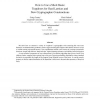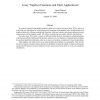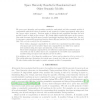80
Voted
ECCC
2007
15 years 23 days ago
2007
Abstract. Combining classical approximability questions with parameterized complexity, we introduce a theory of parameterized approximability. The main intention of this theory is ...
63
Voted
ECCC
2007
15 years 23 days ago
2007
We give a self-contained exposition of selected results in additive combinatorics over the group GF(2)n = {0, 1}n. In particular, we prove the celebrated theorems known as the Bal...
52
Voted
ECCC
2007
15 years 23 days ago
2007
101
Voted
ECCC
2007
15 years 23 days ago
2007
We show how to construct a variety of “trapdoor” cryptographic tools assuming the worst-case hardness of standard lattice problems (such as approximating the length of the sho...
98
Voted
ECCC
2007
15 years 23 days ago
2007
Program checking, program self-correcting and program selftesting were pioneered by [Blum and Kannan] and [Blum, Luby and Rubinfeld] in the mid eighties as a new way to gain con�...
73
Voted
ECCC
2007
15 years 23 days ago
2007
115
Voted
ECCC
2007
15 years 23 days ago
2007
Satisfiability algorithms have become one of the most practical and successful approaches for solving a variety of real-world problems, including hardware verification, experime...
130
Voted
ECCC
2007
15 years 23 days ago
2007
We propose a general cryptographic primitive called lossy trapdoor functions (lossy TDFs), and use it to develop new approaches for constructing several important cryptographic to...
96
Voted
ECCC
2007
15 years 23 days ago
2007
Algorithmic meta theorems are algorithmic results that apply to whole families of combinatorial problems, instead of just specific problems. These families are usually defined i...
101
Voted
ECCC
2007
15 years 23 days ago
2007
We prove space hierarchy and separation results for randomized and other semantic models of computation with advice where a machine is only required to behave appropriately when g...



